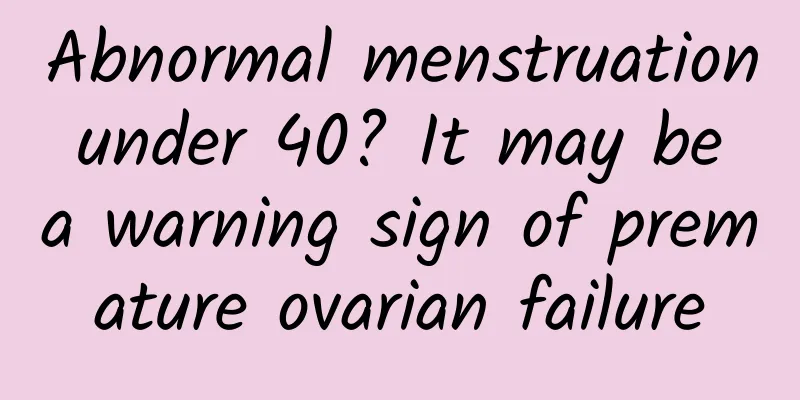Abnormal menstruation under 40? It may be a warning sign of premature ovarian failure

|
Premature ovarian failure, commonly known as premature ovarian failure (POF), is a condition that affects women's reproductive health. Normally, women enter perimenopause between the ages of 45 and 55, and their ovarian function naturally declines. However, if ovarian function declines before the age of 40, menstrual cycles become abnormal or stop, and estrogen levels decrease, it may indicate premature ovarian failure. This not only accelerates the physiological aging process, but also greatly reduces fertility. 1. Irreversibility of premature ovarian failure The essence of ovarian failure is the depletion of egg cells, which is an irreversible process. Women are born with a fixed number of eggs, usually between 2 and 3 million. As they age, these numbers continue to decrease. By the time they reach puberty, the number of egg cells has dropped to an average of several hundred thousand. Only one egg matures and is ovulated each month. Therefore, once ovarian function is damaged, it cannot be restored. 2. Treatment of premature ovarian failure The treatment of premature ovarian failure requires comprehensive management, mainly including: Estrogen replacement therapy : By supplementing natural or near-natural estrogen, it can relieve symptoms caused by low estrogen levels and protect organs such as the cardiovascular system, bones, and reproductive tract. Nutritional supplementation : Increase calcium intake, maintain a balanced diet, and ensure adequate intake of carbohydrates, fats, proteins and vitamins. Auxiliary treatment with traditional Chinese medicine : Combined with Western medicine treatment, the theory of traditional Chinese medicine is used to regulate kidney deficiency, spleen and kidney deficiency, yin and yang deficiency, etc. Regular exercise : helps prevent osteoporosis and cardiovascular disease and relieves menopausal symptoms. 3. Premature ovarian failure and fertility For patients with premature ovarian failure who still want to have children, although the fertility rate is lower, there is still a certain chance. Younger patients have a greater chance of having children. Treatments include estrogen replacement therapy to restore ovulation and assisted reproductive technology such as in vitro fertilization. At the same time, new technologies such as ovarian transplantation and egg freezing and thawing are in the research stage, which may provide more fertility options for patients with premature ovarian failure in the future. |
<<: How to prevent the occurrence and development of diabetes and its complications?
>>: ECPR: How to save lives in emergencies?
Recommend
The "Nth Room Incident" is not the first time
Recently, with the arrest of a man codenamed &quo...
Beware! Seed oils in ultra-processed foods may contribute to colon cancer risk
Author: Huang Yanhong Duan Yuechu In recent years...
What tests are there during the entire pregnancy?
Prenatal check-ups not only allow expectant mothe...
Symptoms of irregular endometrial shedding
In recent years, more and more people have begun ...
What is the thickness of the lining of the vagina on the 8th day of menstruation?
The uterus is a relatively important reproductive...
Breast lumps after lactation
If you have breast pain and lumps after lactation...
Can I get pregnant at 40?
Some people have children when they are old. Not ...
Why is the Chanel style popular in 2019? Chanel style jackets are recommended by internet celebrities on Taobao
Have you bought the popular Chanel style this yea...
Eating chili peppers during late pregnancy can cause fetal movement
If you eat less irritating food in the early stag...
Cataracts, the "killer" of vision in the elderly
Author: Ma Jianli, deputy chief physician, Weifan...
14-year-old girl's chest nipple picture
Generally speaking, 14-year-old girls have alread...
Can pregnant women take clarithromycin?
Clarithromycin tablets are clarithromycin. Chemic...
ComScore: The CPM of social network is $0.56 and that of EDM is $0.94 for different media channels.
The above chart is a comScore CPM statistic for d...
Can pregnant women with high blood sugar eat oranges?
High blood sugar is a very common disease in norm...
Is it normal to have a heavy menstrual flow for the first time after childbirth? There are these common reasons
A woman's menstruation will stop after she be...









